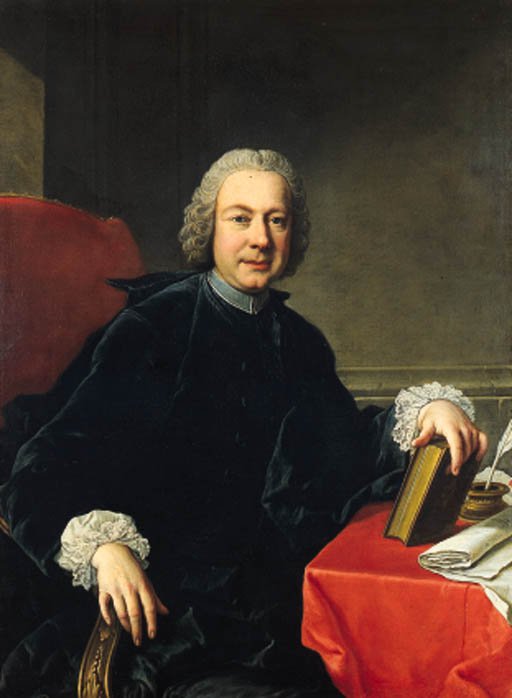Poet, librettist and moralist.
Metastasio`s early education in Rome was guided by Cardinal Pietro Ottoboni and Gianvincenzo Gravina, a founding member of the first Arcadian Academy established in Rome (1690). In 1719, Metastasio moved to Naples — where his early career flourished through works written for well-connected members of the aristocracy and through opera seria texts set by the leading Italian composers, among them Vinci, Porpora and Sarro — and by imperial invitation, in 1730 he moved to Vienna, where he was appointed Imperial court poet. With the passing of the court theatre to private enterprise and a shift in taste from Italian opera to French and subsequently to German theatre, Metastasian opera left the Viennese stage around 1765 and did not return until the 1790s for a short-lived revival under Leopold II.

Martin van Meytens (attr.) or Pompeo Batoni (attr.), Pietro Metastasio (privately owned)
- Mozart Relevance
-
Mozart set Metastasian texts throughout his life: the arias ‘Va, dal furor portata’ K21 and ‘Conservati fedele’ K23 date from 1765, La clemenza di Tito from 1791. The composer and poet first met in Vienna in 1767-1768, when Metastasio championed La finta semplice K51. And in Milan, in 1770, Mozart was given the 1757-1768 Turin edition of Metastasio`s works as a gift, from which he set `Non curo l`affetto` (K74b, of uncertain authenticity), `Per pietà, bell`idol mio` K78, the two scenes `Misero me—Misero pargoletto` K77 and `Oh, temerario Arbace—Per quel paterno` K79, and the arias `Se adire, e speranza` K82, `Se tutti i mali miei` K83 and `Fra cento affani` K88. Metastasio made additions and alterations to the text of Lucio Silla K135 and two Metastasian works were set by Mozart in Salzburg in 1771 and 1772 respectively, the oratorio La Betulia liberata K118 and the azione teatrale Il sogno di Scipione K126. Metastasio's Il re pastore was set by Mozart as a serenata (K208) for Munich in 1775. Other Metastasian settings by Mozart include the lost 'Misero tu non sei' K73A, the arias 'Alcandro, lo confesso—Non so, d'onde viene' K294 and K512 (based on act III, scene 6 of Metastasio’s Olimpiade, 1733), 'Basta, vincesti—Ah non lasciarmi' K295a, 'Ma, che vi fece, o stelle-Sperai vicino il lido' K368, 'Misera, dove son!—Ah! non son' io che parlo' K369, 'Così dunque tradisci—Aspri rimorsi atroci' K432, and 'Ah se in ciel, benigne stelle' K538, and the canzonettas K436-439 and K549.
For ease of reference, the following table shows Mozart compositions that draw on Metastasian texts.
Mozart work Metastasian source K21 Aria 'Va, dal furor portata' Ezio, 1728, act II, scene 4 K23 Aria 'Conservati fedele' Artaserse, 1730, act I, scene 1 K73A 'Misero tu non sei' Demetrio, 1731, act I, scene 4 K74b 'Non curo l`affetto' Demofoonte, 1733, act I, scene 7 K77 'Misero me—Misero pargoletto' Demofoonte, 1733, act III, scene 5 K78 'Per pietà, bell`idol mio' Artaserse, 1730, act I, scene 5 K79 'Oh, temerario Arbace—Per quel paterno' Artaserse, 1730, act II, scene 11 K82 'Se adire, e speranza' Demofoonte, 1733, act I, scene 13 K83 'Se tutti i mali miei' Demofoonte, 1733, act II, scene 6 K88 'Fra cento affani' Artaserse, 1740, act I, scene 2 K118 (74c) Betulia liberata (1734) Metastasian text K126 Il sogno di Scipione (1735) Metastasian text K135 Lucio Silla (1772) Metastasio made textual additions & alterations K208 Il re pastore (1751) Metastasian text K294 'Alcandro, lo confesso—Non so, d'onde viene' Olimpiade, 1733, act III, scene 6 K295a 'Basta, vincesti—Ah non lasciarmi' Didone abbandonata, 1724, act II, scene 4 K368 'Ma, che vi fece, o stelle-Sperai vicino il lido' Metastasian text K369 'Misera, dove son!—Ah! non son' io che parlo' Ezio, 1728, act III, scene 12 K432 'Così dunque tradisci—Aspri rimorsi atroci' Temistocle, 1736, act III, scene 8 K436-9+K549 Canzonette, various dates Metastasian texts K512 'Alcandro, lo confesso—Non so, d'onde viene' Olimpiade, 1733, act III, scene 6 K538 'Ah se in ciel, benigne stelle' L’eroe cinese, 1752, act I, scene 2 K621 La clemenza di Tito (1734) Metastasian text - Date 1
- 1698-01-03 Rome
- Date 2
- 1782-04-12 Vienna
- Bibliographic Reference
- Mozart, Padova e la Betulia liberata: Padova 1989; Knighton and Burden, ‘Metastasio, 1698–1782’; Hilscher and Sommer-Mathis, Pietro Metastasio, uomo universale (1698–1782); Basso, I Mozart in Italia, 609-611.